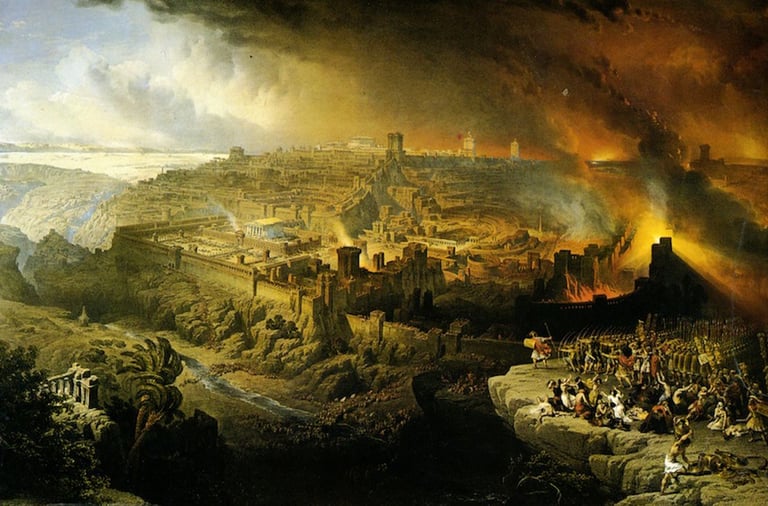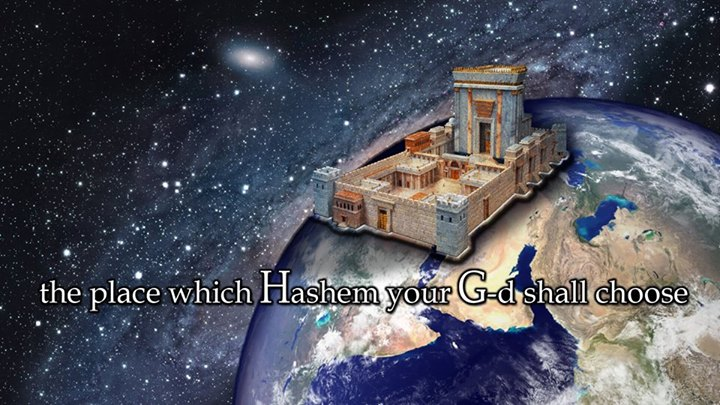TISHA B'Av
Tisha B’Av, or the 9th day of the Hebrew month of Av, is a fast day regarded as the saddest day on the Jewish calendar.The saddest day on the Jewish calendar is the Ninth of Av, “Tisha b'Av," the date on which both our Holy Temples were destroyed, and exile, persecution of jewish people, tzaddik ones and spiritual darkness began because of selfishness, disunity and lack of respect for each other.
GADDI NOTES FROM SAGES WRITINGS - TISHA B'Av
a.The Temple was destroyed of sinat chinam(baseless hatred)
b. All you who mourn over her (Jerusaleam)- (Lamentations & Isaiah ),Blessed Are Those Who Mourn -Brit Hadshah
c. Exile and Redemption
d. Birth of Final Reedemer and Redemption
After the Mashiach comes, Tisha b’Av will be transformed into a day of joy and gladness and feasting




*The Temple will be rebuilt, and Mashiach will return to be with us for eternity.
*Understand the Destruction of the Temple and the Suffering of Tzaddik
a.The Temple was destroyed of sinat chinam(baseless hatred)
Destruction Temple - Sinat Chinam
Its very important note that the cause for the destruction of the Beit HaMikdash was sinat chinam, baseless hatred:
But why was the second Sanctuary destroyed . . . .. Because therein prevailed hatred without cause.”Yoma 9b, Soncino Press Edition"
Hatred of Tzaddik - Sinat Chinam
Our understanding regarding of Yeshua are indeed very Jewish Rabbi Tzaddik!
Note - “Tzaddik,” means “Righteous One”
This is a mystery and it was an offer to Israel, if they repented, they would be worthy to receive Mashiach ben David in that generation. However, like Mashiach Ben Yosef HaTzaddik, he experienced sinat chinam, as he says,“He that hates me hates my Father also. If I had not done among them the works which none other man did, they would not have sinned: but now have they both seen and hated both me and my Father. But this has come to pass, that the word might be fulfilled that is written in their Torah, ‘They hated me without a cause.’ -Brit Hadshah, John 15:23-25
b.Blessed Are Those Who Mourn -Sages and Brit Hadshah
the sages derive that this day fell on the Ninth of Av.
The Holy One, blessed be He, said to them: "You have wept without cause, therefore I will set [this day] aside for a weeping throughout the generations to come."
Traditionally, the Ninth of Av is remembered with a complete fast from sundown to sundown, marked by refraining from both food and water. It is also a custom to read the book of Lamentations on this day. Although there is no command to fast on the Ninth of Av found in the Torah, the Prophet Zechariah mentions the fast of the fifth month. An allusion to the future fasting of the disciples is seen in the Master’s words, "But the days will come when the bridegroom is taken away from them, and then they will fast." -Brit Hadshah,Matthew 9 : 15
Jewish Rabbi Yeshua Tzaddik given instruction to us that the mourners shall be comforted. - Brit Hadshah, Matthew 5 : 4
Rejoice with Jerusalem, and be glad for her, all you who love her; rejoice with her in joy, all you who mourn over her. -Isaiah 66:10
c. Exile and Redemption
This is the purpose of the exile, not to punish but to cleanse and refine.
When the Talmud quotes Micah, it is telling us that the nature of exile is darkness, and the nature of redemption is light. Just like the morning light appears little by little and slowly gets brighter and brighter, the same is true with the light-like redemption of Israel.
Likewise, on the day that the Master suffered, the sun turned dark at noon:
The light of the sun … departed from the world since the day when the Temple was destroyed, as is hinted in the verse [Isaiah 13:10]: “The sun will be darkened in its going forth.” (Zohar I:196b)
And hinei! The parochet of the Beis Hamikdash was torn in two from top to bottom, and the earth shook; and the rocks were split -Brit Hadshah, Matthew 27
The Vilna Gaon Writings, On the Ninth of Av, when we mourn the destruction of Jerusalem and the Temples, we read the book of Lamentations There we find that exile is characterized as darkness, in fact, the ultimate darkness: death itself.
I am the Man … I have been led and driven into darkness, without light … He has worn away my flesh and my skin; and shattered my bones … has placed me in darkness, like the forever dead*.”* Eichah, Book of Lamentations 3:1-6
I am the Man is the collective body of the nation of Israel that has been shattered and driven to the darkest of places, the place of death, the death of exile. For the nation of Israel, death comes with the destruction of the Temple in Jerusalem. That nightmare event is the severing of the national soul from the collective body of Am Yisrael.
Listen to the words of the Vilna Gaon—
“…ever since the time of the destruction of the Temple we have been like a body without a soul. Being driven out of the land of Israel is to the Jewish people what the grave is to the dead body of an individual. Chutz l’aretz, the lands of our exile, are a graveyard. And just like a body in the grave is powerless in the face of the insects and elements that tear away at it, so are we in the face of the nations of the world. And yet there remained, even in exile, large and significant communities, but just as the flesh and skin [of the individual] decay in the grave, so too the people of Israel: the flesh and sinews that bound us together decayed until there was nothing but bones, scattered bones, that with the passage of time became strewn further and further across the lands of exile. Gone was the unity, the deep, common bond of collective identity. All that remained were bones, here and there. And these scattered bones, these were the scholars (talmidei chachamim) that still possessed the last breath of larger life, until they too began to decay. Until all that remained was a small “spoonful,” of dust … and we hope and long for the day when we will arise from the dust that we have become, and when new life from Above will be poured upon us.”
Let’s look at the book of Ezekiel,“The hand of G-d was on me; and it took me out by the spirit of G-d and sat me in the valley that was filled with bones. And He passed me over them, and they were numerous in the valley, and they were exceptionally dry … He said to me, “prophesy over these bones, say to them, ‘dry bones, hear the word of G-d.’ And G-d said to these dry bones, ‘I am bringing a spirit into you, and you will come to life. I will put sinews on your [bones], I will give you flesh, and cover you with skin …’ I then prophesized as I was commanded. As I spoke my prophecy, there was a sound; there was a loud noise, and the bones began to move towards one another. [Bones that had once been part of the same body found one another.]
“And I saw that they had sinews and flesh and skin, but there was no spirit in them. Then He said to me, “Prophesy to the spirit and say, ‘God says: Spirit, come from the four directions, and blow into these murdered people and they will come to life.’ …and the spirit entered them and they came to life, and they stood on their feet, an enormous multitude.
“He said to me, “These bones are the entire House of Israel … prophesy and say to them, God has said: I am opening up your graves, and raising you out of your graves, My nation, and I will bring you to the land of Israel … and I will put My spirit in you, and you will come back to life, and I will place you on your soil. Then you will know that I, G-d, have spoken and fulfilled.” -Ezekiel 37:1-14
d. Birth of Final Reedemer and Birth of Redemption
It is a tradition, however, that Tisha b'Av is also the birthday of our Redeemer. This symbolizes the idea that from the ashes of the destroyed temple will rise an incomparably magnificent edifice; exile will give birth to redemption.
According to one legend in the Talmud, the Messiah was born on Tisha b’Av, the same day that the Romans destroyed the Temple. Other opinions suggest that the Messiah should have been born before the destruction of the Temple
Ashes and Dust
Thus Tisha b’Av is also a day of anticipation and hope, for “One who mourns Jerusalem will merit seeing her happiness." From our ashes will come the Redemption for this world. Raba said: As a reward for our father Abraham having said: I am but dust and ashes. -Genesis 18 : 27
Zechariah declares that our fasts will become feasts as we celebrate what HaShem has done:
Thus says the Adonai of hosts, "The fast of the fourth, the fast of the fifth, the fast of the seventh and the fast of the tenth months will become joy, gladness, and cheerful feasts for the house of Judah; so love truth and peace.
We are anticipating the Coming of the Mashiach and praying for our redemption from exile in our time.
The Temple will be rebuilt, and Mashiach will return to be with us for eternity.
